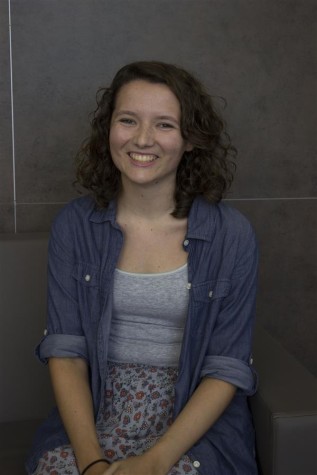The ink flows across the lined pages, spilling one word after another: “… I knew something was trembling. A secret, foreboding a new era. A deadly secret – I could feel it in my bones – that would seal a family’s fate in its cold, unforgiving grasps… But my discomfort would have to wait…” The pen hesitates, a single splotch of ink smudging the paper, before it is set on the table. The rest of this story would have to wait.
The novel-in-progress is called The Darkness Dreams. The story follows a young princess from the icelands of Ser’ciniya, which is located on the planet of Mewau. After her sister’s untimely death, Princess Lazu’lai is forced to marry a royal from the iceland’s rivals in the firelands of Kasi. Yet what is unique about this particular piece of writing is that sophomore Angela Hoffman is the mind behind the pen.
“The time I formed the idea for The Darkness Dreams was about the time I started writing; about second or third grade,” Hoffman said. “I used to write strange stories that I would get called to the principal for.”
Despite her trouble with discipline as a child, Hoffman kept her story going. The plot for the entire seven book series is complete, but her first book is still in progress. She hopes to finish and publish the first novel within the next two years, possibly getting into Little, Brown Publishing Company. Many of her literary heroes, like action book author James Patterson, have their books published by Little, Brown. But Hoffman said getting a company to pay attention to a young writer is harder than it seems.
“I have been denied several times because of my age,” Hoffman said. “Sometimes they’ve said to me, basically, ‘I didn’t read this, but you’re underage, so I just threw it away,’ and it’s very unfair because it’s looking at me from an age standpoint and not my talent standpoint.”
Most companies require potential authors to submit personal information, and many say that one must be at least the age of 18. Hoffman is still determined despite these rules, listing The Outsiders by S. E. Hinton as an example of someone as young as 16 publishing a book that has been read for decades.
“It’s a very big thing to get a book published, especially at the age of sixteen,” Hoffman said. “I want to prove that you don’t have to be eighteen to be able to write. That’s what I want to do; I want to be an inspiration.”
Despite this positive outlook, Hoffman has had ough days. She admits to having felt like wanting to quit, and the reasons are heavily based on her emotions.
“When I write, I take out my emotions on my writing,” Hoffman said. “I’ll cry in scenes that are sad, and I’ll be happy in scenes that are victorious. If I’m stressed or if I’m tired, those things block my writing for days.”
Still, she finds courage in the fact that she is trying to take on something that many others of her generation would not even think about. Hoffman does not let this generation’s lack of wanting to read affect her writing. In fact, it inspires her to continue. She said she hopes that the younger generation might pick up her book one day and treasure it as much as the famed Harry Potter series by J.K. Rowling and the popular Twilight Saga by Stephanie Meyer.
“Even if I don’t get published, if people know [about my writing], they look up to that,” Hoffman said. “They think it’s interesting, it’s cool and it’s won a lot of teacher’s approval.”
The views on younger people becoming published vary, though. Sophomore Erin Williams said she feels that her and Hoffman haven’t had enough experience to be published.
On the opposite end of the spectrum, sophomore Breann Stearns said she believes the book could help society understand the teenage mind-set and show how young writers are just as good.
No matter what other people think, Hoffman said she is determined to finish and publish her story. She encourages other young writers, too. She said she wants others to know that no idea is no worth it, to never let the publishing industry affect you, and above all, to oneself.
“You can’t fake writing, there’s no way to do it,” said Hoffman. “You just have to be able to spill your own emotions out on a page. You can’t fabricate it, sometimes you can’t even think about it. You just have to let it happen.”







